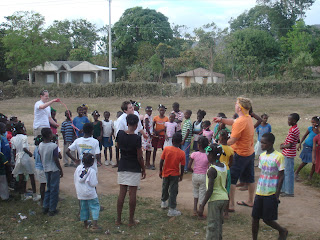Matthew 28
Disclaimer: The following is my (Dave's) opinion and is, largely, the opinion
of Team Haiti 2012.
I'm having some difficulty
with the administration of the Matthew 28
orphanage.
While it appears to be financially
sponsored by a faith-based group in the U.S., it is, supposedly, run "autonomously"
by Haitians here in the Bohoc area.
When we got to the
orphanage on Saturday, we met a representative of the U.S. sponsoring group. Quite honestly, I did not particularly like
the philosophy communicated by this person.
His "message" did not include a lick about empowering the
children at Matthew 28 to, someday, rise
above their circumstances. In my
opinion, his attitude seemed a little defeatist. Here is a paraphrased summary of what he
said: "We're taking care of the
children at a level consistent with the lower-levels of care in Haiti. If we don't do this, these children will grow
up and be unable to assimilate effectively back into the impoverished lifestyles
and living arrangements of the vast majority of Haitians."
While the situation is, I'm
quite sure, complex, the Matthew 28 organization
may be an example, at least to an extent, of an instance where money is being tossed
at a problem without a solid relationship between the funding group and those
running the orphanage. There appears to
be little, if any, accountability. The U.S.
representative told us, among several things, that the kids get three meals a
day. Based on our discussions with one
of the older residents yesterday--a resident who'd been living at the orphanage
for last fifteen years--the number of meals varies (based on available money) from
one a day to, at times, three a day. We
learned that meals are typically comprised of rice and beans and that it's probably
been about three months since the kids have had any kind of meat. We learned also that the consumption of fruit
and vegetables is, essentially, non-existent.
There appears to be a definite disconnect between the U.S. organization
and the Haitians running the orphanage. My
question is this: Where's the money
going? And who's watching such things?
Another concern is that the
kids at Matthew 28 appear to be almost
completely unsupervised. Of great
concern to me, too, are how the older boys and girls (ages 15-22+) are being
housed in two buildings right next to each other without visible adult
oversight and guidance. There appears to be A LOT
going on there (between the boys/men and girls/women). And the two, outdoor "community
showers" (e.g., open, single-head showers) did not make me feel any better.
On both Saturday and Sunday (yesterday), my internal systems were
sounding pretty loudly. I would not be
surprised (and, of course, this may
just be me) if some of the really young children at the orphanage "belong"
to some of the older girls at the orphanage.
ALSO...it appears that
there are some young adults (young men, mostly) from the surrounding areas who,
on a regular (perhaps daily) basis, come in (some on their motorcycles) to what seems to be a
very open compound "just to hang out with the kids living there." (??!!) This all VERY disconcerting to me.
I would like to push for us
to be able to continue visiting the kids at Matthew
28 during successive trips, as these kids are quite literally starving for
attention, human contact, and the love of God.
I think, though, that we need to have a facilitated discussion with the
older kids about love and respect and God and sex and disease and pregnancy. These discussions would need to be broken-out
into male and female sessions, and, as such, would require both a male and a
female interpreter.
AND ANOTHER
THING...
Where did the 40 additional
children, who were at Matthew 28 in
April, go? And what about these adults who seem to have free and open access to
the children living at the orphanage? Ummm (and, again, this is just a personal conjecture)...but were some of the "missing" 40 kids
taken? Again, this is all very
disconcerting to me.
Please keep all of this in
your prayers, my friends.
Dave (On Behalf of Team
Haiti 2012)
PS When we get back this evening, I'll write about today's activities, which
have been marvelous so far. God's peace to all'y'all...



























+072.JPG)
+102.JPG)
+118.JPG)
+130.JPG)
+153.JPG)
+158.JPG)
+165.JPG)
+168.JPG)
+202.JPG)
+205.JPG)
+206.JPG)
+217.JPG)
+258.JPG)
+260.JPG)
+300.JPG)
+359.JPG)
+364.JPG)
+365.JPG)